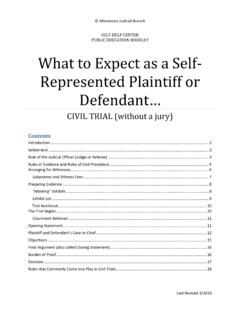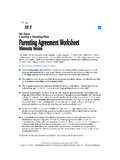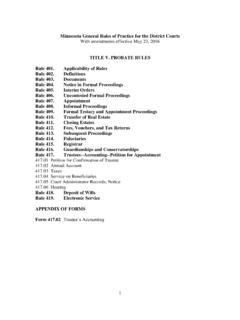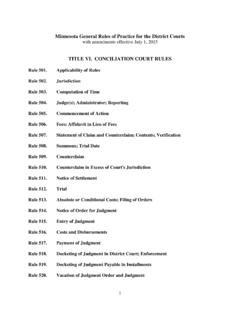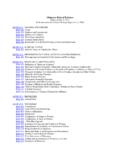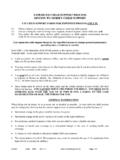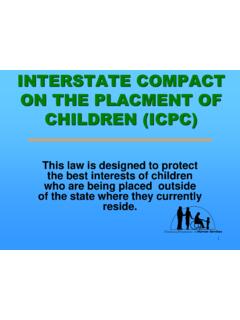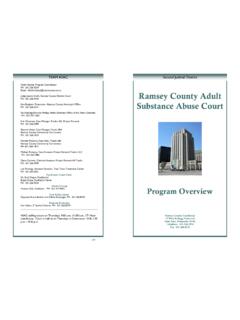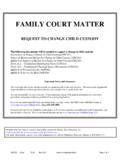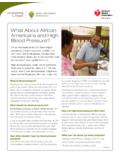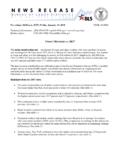Transcription of What to Expect as a Self-Represented Plaintiff or …
1 Minnesota Judicial Branch self HELP CENTER. PUBLIC EDUCATION BOOKLET What to Expect as a self . represented Plaintiff or Defendant CIVIL TRIAL (without a jury) Contents Introduction .. 2 Settlement .. 3 Role of the Judicial Officer (Judge or Referee) .. 4 Rules of Evidence and Rules of Civil Procedure ..4 Arranging for Witnesses .. 6 Subpoenas and Witness Fees .. 7 Preparing Evidence .. 8 Marking Exhibits .. 8 Exhibit List .. 9 Trial 10 The Trial Begins .. 10 Courtroom Behavior .. 11 Opening Statement.
2 11 Plaintiff and Defendant's Case in Chief .. 12 Objections .. 15 Final Argument (also called Closing Statement) .. 16 Burden of Proof .. 16 Decision .. 17 Rules that Commonly Come into Play in Civil 18 Last Revised 3/2010 Introduction This booklet is intended for Self-Represented parties preparing for trial in a civil case. Trials are complicated. This booklet is meant to make the trial more understandable, but we can't make it less complicated. Most civil case trials do not involve a jury. Instead, the Judge decides what facts are proven.
3 A jury is used only if a party requests a jury, pays the jury fee, and if a jury is allowed for that type of case. This booklet does not cover issues related to juries. A trial is not the same as a court appearance or motion hearing. The trial is the final phase of a civil case, where witnesses and evidence are presented. Many other hearings may occur before the trial or instead of a trial. This booklet does not explain what happens at other court appearances. Carefully read all orders and letters from the Court to understand what is expected at each court appearance.
4 If you are unsure, you can call the Court for clarification. In addition to reading this booklet, we encourage you to: Watch a trial at the courthouse. Most trials are open to the public. Get advice from a lawyer. You can hire a lawyer for a one-time consultation, or for ongoing coaching as you move ahead in the case. Limited scope services is an alternative to having a lawyer represent you fully. For information on finding a lawyer: Go to a law library for more information about Civil Trials. Lawyers study this, and so can you.
5 For a list of libraries: Watch a video of a simple trial at This video shows a Conciliation Court trial (case under $7,500). A case for a larger amount will be more complicated, but the video helps with basic concepts. Visit the court's online self -Help Center for general information about civil cases and for lawyer referral information: 2 Settlement Many cases settle the day of trial sometimes before, and sometimes after testimony is given. Settle means that the parties involved reach an agreement and the Judge approves the agreement.
6 You may be asked several times at different stages of the case to try to settle your dispute. The Judge may require both parties to meet or attend mediation to try to reach a settlement before the trial starts. The Judge may also schedule a Pre-Trial Conference to talk with the parties about the trial issues and evidence and take steps to speed up the actual trial. You should come to the Pre-Trial Conference prepared to offer a solution to settle the case, and be ready to consider settlement offers from the other side.
7 Each time you come to court, including at the final trial, you can Expect the Judge to ask you and the other party what you have done to try to settle the case. A settlement allows the parties to find creative solutions that fit their needs, and also allows parties to have a known result. Going to trial and letting the Judge or jury decide is always a gamble. If you and the other party reach an agreement before the trial day, call your judicial officer's clerk right away. If there is a trial, things will happen in this order: 1.
8 Opening statements 2. Plaintiff 's case-in-chief (witnesses and exhibits). 3. Defendant's case-in-chief (witnesses and exhibits). 4. Final arguments These stages of the trial are explained further starting on page 10. 3 Role of the Judicial Officer (Judge or Referee) The Judge's role is to assure that the trial proceeds in an orderly manner, and that both sides have as full an opportunity to be heard as the rules of procedure and evidence allow. In a Civil Trial without a jury, the Judge also decides if the Plaintiff has proven his case, and what the award or outcome will be.
9 The Judge will give you general guidance on what is expected and how the trial will go. Within the scope of the issues raised in the Complaint and Answer, you decide what topics to cover, what evidence is important, and what questions to ask of witnesses. The Judge must be neutral and fair to both sides. He or she is the umpire, not the coach. The Judge may ask a question of a witness to clarify something but will not take over and ask all the questions he or she thinks are important. It is your case, and you decide what you want the Judge to hear and see.
10 Rules of Evidence and Rules of Civil Procedure The Judge will conduct the trial using the Minnesota Rules of Civil Procedure and the Minnesota Rules of Evidence. You can find these rules in county law libraries and online at Law Libraries also have books that explain more about the Rules of Civil Procedure and Rules of Evidence, and include excerpts from court cases that have interpreted the Rules. No one can predict in advance exactly which rules will come into play, but some of the rules that most frequently apply are found at the end of this booklet.
